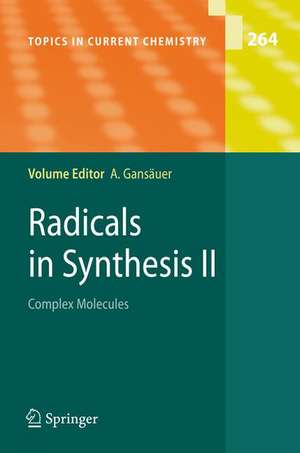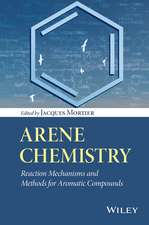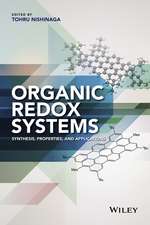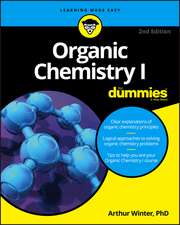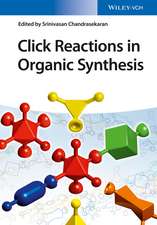Radicals in Synthesis II: Complex Molecules: Topics in Current Chemistry, cartea 264
Editat de Andreas Gansäueren Limba Engleză Hardback – 20 mar 2006
| Toate formatele și edițiile | Preț | Express |
|---|---|---|
| Paperback (1) | 1814.24 lei 6-8 săpt. | |
| Springer Berlin, Heidelberg – 16 noi 2010 | 1814.24 lei 6-8 săpt. | |
| Hardback (1) | 1820.40 lei 6-8 săpt. | |
| Springer Berlin, Heidelberg – 20 mar 2006 | 1820.40 lei 6-8 săpt. |
Din seria Topics in Current Chemistry
-
 Preț: 408.82 lei
Preț: 408.82 lei -
 Preț: 448.88 lei
Preț: 448.88 lei -
 Preț: 376.80 lei
Preț: 376.80 lei -
 Preț: 393.95 lei
Preț: 393.95 lei -
 Preț: 386.00 lei
Preț: 386.00 lei - 15%
 Preț: 637.93 lei
Preț: 637.93 lei -
 Preț: 387.75 lei
Preț: 387.75 lei - 15%
 Preț: 631.72 lei
Preț: 631.72 lei -
 Preț: 381.21 lei
Preț: 381.21 lei -
 Preț: 382.36 lei
Preț: 382.36 lei -
 Preț: 383.71 lei
Preț: 383.71 lei - 15%
 Preț: 634.49 lei
Preț: 634.49 lei -
 Preț: 387.75 lei
Preț: 387.75 lei -
 Preț: 390.82 lei
Preț: 390.82 lei -
 Preț: 380.07 lei
Preț: 380.07 lei - 15%
 Preț: 637.59 lei
Preț: 637.59 lei -
 Preț: 387.38 lei
Preț: 387.38 lei -
 Preț: 384.31 lei
Preț: 384.31 lei -
 Preț: 382.75 lei
Preț: 382.75 lei - 15%
 Preț: 635.96 lei
Preț: 635.96 lei - 15%
 Preț: 645.96 lei
Preț: 645.96 lei -
 Preț: 380.07 lei
Preț: 380.07 lei -
 Preț: 382.95 lei
Preț: 382.95 lei -
 Preț: 402.30 lei
Preț: 402.30 lei -
 Preț: 379.86 lei
Preț: 379.86 lei - 15%
 Preț: 639.59 lei
Preț: 639.59 lei -
 Preț: 388.52 lei
Preț: 388.52 lei - 15%
 Preț: 637.13 lei
Preț: 637.13 lei -
 Preț: 381.21 lei
Preț: 381.21 lei - 15%
 Preț: 640.71 lei
Preț: 640.71 lei -
 Preț: 380.07 lei
Preț: 380.07 lei -
 Preț: 386.61 lei
Preț: 386.61 lei -
 Preț: 389.49 lei
Preț: 389.49 lei -
 Preț: 389.49 lei
Preț: 389.49 lei -
 Preț: 383.93 lei
Preț: 383.93 lei -
 Preț: 395.10 lei
Preț: 395.10 lei -
 Preț: 385.62 lei
Preț: 385.62 lei -
 Preț: 384.48 lei
Preț: 384.48 lei -
 Preț: 383.50 lei
Preț: 383.50 lei -
 Preț: 382.36 lei
Preț: 382.36 lei -
 Preț: 382.36 lei
Preț: 382.36 lei -
 Preț: 382.18 lei
Preț: 382.18 lei -
 Preț: 382.95 lei
Preț: 382.95 lei - 15%
 Preț: 641.03 lei
Preț: 641.03 lei -
 Preț: 386.61 lei
Preț: 386.61 lei -
 Preț: 383.50 lei
Preț: 383.50 lei -
 Preț: 378.34 lei
Preț: 378.34 lei - 15%
 Preț: 490.28 lei
Preț: 490.28 lei -
 Preț: 378.92 lei
Preț: 378.92 lei - 15%
 Preț: 636.30 lei
Preț: 636.30 lei
Preț: 1820.40 lei
Preț vechi: 2219.99 lei
-18% Nou
Puncte Express: 2731
Preț estimativ în valută:
348.32€ • 363.71$ • 287.64£
348.32€ • 363.71$ • 287.64£
Carte tipărită la comandă
Livrare economică 15-29 aprilie
Preluare comenzi: 021 569.72.76
Specificații
ISBN-13: 9783540313250
ISBN-10: 3540313257
Pagini: 266
Ilustrații: XII, 249 p.
Dimensiuni: 155 x 235 x 22 mm
Greutate: 0.55 kg
Ediția:2006
Editura: Springer Berlin, Heidelberg
Colecția Springer
Seria Topics in Current Chemistry
Locul publicării:Berlin, Heidelberg, Germany
ISBN-10: 3540313257
Pagini: 266
Ilustrații: XII, 249 p.
Dimensiuni: 155 x 235 x 22 mm
Greutate: 0.55 kg
Ediția:2006
Editura: Springer Berlin, Heidelberg
Colecția Springer
Seria Topics in Current Chemistry
Locul publicării:Berlin, Heidelberg, Germany
Public țintă
Professional/practitionerCuprins
M. Albert, L. Fensterbank, E. Lacôte, M. Malacria: Tandem Radical Reactions.- J.M. Cuerva, J. Justicia, J.L. Oller-López, J.E. Oltra: Cp2TiCl in Natural Product Synthesis.- A. McGhee, D. Procter: Radical Chemistry on Solid Support.- S.G. Hansen, T. Skrydstrup: Modification of Amino Acids, Peptides and Carbohydrates Through Radical Chemistry.- J. C. Walton: Unusual Radical Cyclisations.- B. Quiclet-Sire, S.Z. Zard: The Degenerative Radical Transfer of Xanthates and Related Derivatives: An Unusually Powerful Tool for the Creation of Carbon-Carbon Bonds.
Recenzii
From the reviews:
"The use of organic free radicals in organic synthesis has matured to become a diverse and sophisticated endeavor. this volume of Topics in Current Chemistry is the successor to Radicals in Synthesis I and addresses the application of radical methodologies toward the efficient assembly of complex molecules. Many of these processes highlight the exquistie chemoselective, regioselective, and diastereoselective reactions achievable by employing free-radical intermediates, often under conditions that are experimentally mild and environmentally benign."
"Thus this book is a very valuable resource for those wishing to update their knowledge with a compendium of work by leading practitioners in the field."
"In summary, this diverse collection of topics gives a sampling of the very sophisticated and powerful methodologies utilized in the construction of complex organic small molecules using radical intermediates. Consistently, the focus is on the newest advances in the field, highlighting very recent works while providing references to valuable reviews of previous work. In a few of the early chapters, the specifics are hard to follow in instances where details are discussed but no structures are provided. However this failing only occurs in a few cases; most of the work is clearly illustrated. This Collection of thoughtfully written chapters serves to highlight the impressive efficiency and selectivity of free-radical chemistry as a powerful and rapidly developing field."
from: R. Braslau, University of California, J.Am.Chem.Vol.128, No.40, 2006
"The second volume (Complex Molecules) focuses on the use of radicals in synthetic applications. … The chapters, written by leading experts, provide state-of-the-art reviews of exciting and pertinent topics of current research in radical chemistry. … is a masterly attempt at setting radicals in synthesis in context. Any researcher involved in thefield should have ready access to it. … deserve to be widely read and debated." (Current Engineering Practice, 2007)
"The use of organic free radicals in organic synthesis has matured to become a diverse and sophisticated endeavor. this volume of Topics in Current Chemistry is the successor to Radicals in Synthesis I and addresses the application of radical methodologies toward the efficient assembly of complex molecules. Many of these processes highlight the exquistie chemoselective, regioselective, and diastereoselective reactions achievable by employing free-radical intermediates, often under conditions that are experimentally mild and environmentally benign."
"Thus this book is a very valuable resource for those wishing to update their knowledge with a compendium of work by leading practitioners in the field."
"In summary, this diverse collection of topics gives a sampling of the very sophisticated and powerful methodologies utilized in the construction of complex organic small molecules using radical intermediates. Consistently, the focus is on the newest advances in the field, highlighting very recent works while providing references to valuable reviews of previous work. In a few of the early chapters, the specifics are hard to follow in instances where details are discussed but no structures are provided. However this failing only occurs in a few cases; most of the work is clearly illustrated. This Collection of thoughtfully written chapters serves to highlight the impressive efficiency and selectivity of free-radical chemistry as a powerful and rapidly developing field."
from: R. Braslau, University of California, J.Am.Chem.Vol.128, No.40, 2006
"The second volume (Complex Molecules) focuses on the use of radicals in synthetic applications. … The chapters, written by leading experts, provide state-of-the-art reviews of exciting and pertinent topics of current research in radical chemistry. … is a masterly attempt at setting radicals in synthesis in context. Any researcher involved in thefield should have ready access to it. … deserve to be widely read and debated." (Current Engineering Practice, 2007)
Caracteristici
This series presents critical reviews of the present position and future trends in modern chemical research Short and concise reports on chemistry, each written by the world renowned experts Still valid and useful after 5 or 10 years More information as well as the electronic version of the whole content available at: springerlink.com
